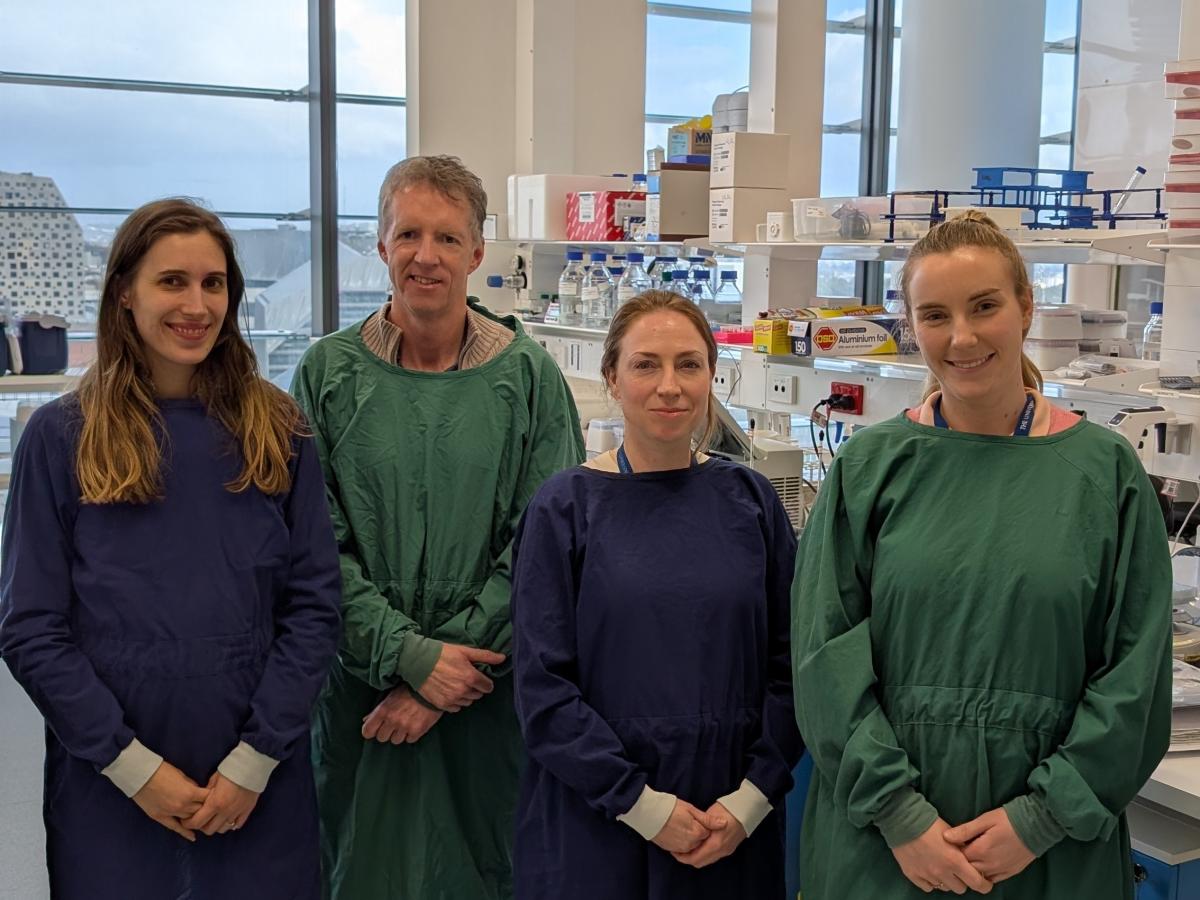Fellows advance immunotherapy and tumour inflammation research

South Australian immunoGENomics Cancer Institute's Dr Mara Zeissig and Professor Brendan Jenkins with new Ainsworth Fellows Dr Tamsin Lannagan and Dr Georgette Radford.
The University of Adelaide’s South Australian immunoGENomics Cancer Institute (SAiGENCI) has welcomed two new researchers through a fellowship program funded by the Ainsworth Foundation.
Dr Georgette Radford and Dr Tamsin Lannagan have joined Professor Brendan Jenkins’ Tumour Inflammation and Immunotherapy research program, with two more Ainsworth Fellows planned to join the team.
At least 25 per cent of cancers are associated with chronic inflammation, which is driven by the over-activation of innate and adaptive immune systems.
“There are a lot of unanswered questions around how inflammation can drive cancers, such as those of the lung, pancreas and stomach which are among the most lethal and common cancers worldwide” says Professor Jenkins.
“Thanks to these Fellowships through the generous support from the Ainsworth Foundation, we can attract the brightest researchers with the skills needed to answer these questions. This funding support is critical to enable much needed discoveries in cancer research.”
Dr Radford just recently completed her PhD at SAHMRI working on gastrointestinal cancers, and will bring her experience to work with Professor Jenkins to identify genes of the innate immune system that drive pancreatic cancer.
“Despite only starting recently, there is so much potential for working on identifying cancer-promoting genes within the innate immune system and how we can target specific genes when over-active to stop disease progression,” says Dr Radford.
“The other main focus of our research program is immunotherapies such as CAR T cell therapy or immune checkpoint inhibitors which harness the ability of cytotoxic T cells in the body to recognise and kill tumour cells,” says Professor Jenkins.
“However, approximately 80 per cent of patients have tumours that do not respond to immunotherapy.”
Dr Lannagan, who joins the team from the University of Edinburgh, is working with Dr Mara Zeissig and her T cell Immunotherapy Laboratory
“Lung cancers respond poorly to immunotherapy, in part due to the very little cytotoxic immune cells present. We are looking to overcome this by finding genes expressed by the cancer that can be drug targets to increase the number of immune cells in the tumours and re-invigorate the response to immunotherapy,” says Dr Lannagan.
“Our lab’s goal is to develop tailored, effective immune-based treatments for lung cancer patients that currently have little or no treatment options,” says Dr Zeissig.
Ainsworth Foundation Chairman Len Ainsworth said he was proud to support SAiGENCI’s research.
“We are very pleased to see progress to enlarge the team researching the impact of inflammation on various cancers and the application of immunotherapy and gene editing to identify pathways to cure the most challenging cancers,” says Mr Ainsworth.
Media Contacts:
Professor Brendan Jenkins, Program Head, SAiGENCI, The University of Adelaide. Phone: +61 (8) 8313 3155. Email: brendan.jenkins@adelaide.edu.au
Rhiannon Koch, Media Officer, The University of Adelaide. Mobile: +61 (0)481 619 997. Email: rhiannon.koch@adelaide.edu.au
